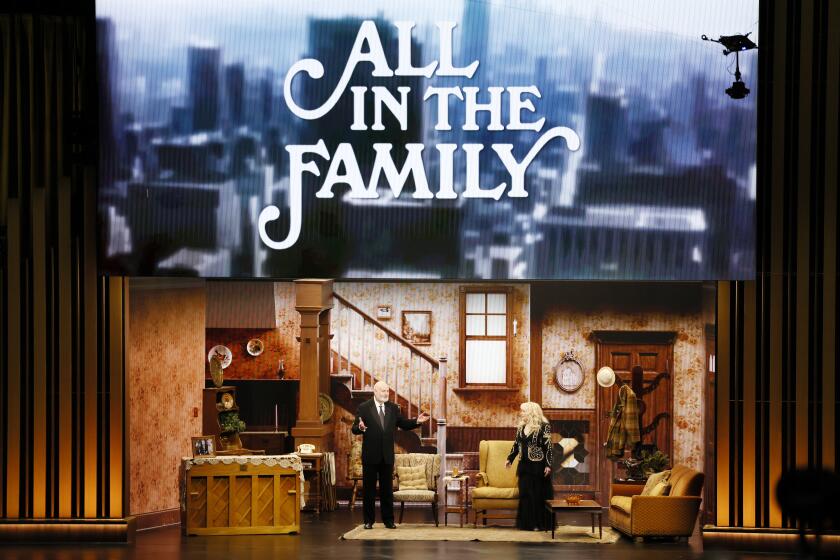‘Love’ gone sour
If St. Theresa is to be believed, more tears are shed over answered prayers than unanswered ones. Which puts HBO’s new dramatic series “Tell Me You Love Me” smack in the Answered Prayers category. I am, I admit, one of those wearisome people who, after watching some perfectly nice romantic drama, will heave an irritated sigh and whine: “Why don’t they ever do a show about what marriage is really like?” Now, thanks to “Tell Me You Love Me,” I know.
Because it’s boring, that’s why. To tears.
Oh, I know this sounds impossible since everyone’s been talking about all the sex involved, including graphically portrayed masturbation and so much full frontal nudity that you feel positively European while watching it. Certainly we are not used to this level of genitalia in even our cable programming. The sex in “Tell Me You Love Me” is, however, intentionally non-erotic, used instead as a sort of cinematic shorthand for what the series is attempting to do -- capture the warts-and-all work of maintaining an intimate relationship despite the trials of time and imperfections of daily life.
An admirable goal, but one requiring, as any successful relationship does, a sense of humor and a certain level of humility. Both of which “Tell Me You Love Me” almost completely, and unforgivably, lacks.
Instead we are given three couples up to their elbows in narcissism, contemplating the various crises of their white, middle-class lives. Jamie and Hugo (Michelle Borth and Luke Kirby) are suffering the classic second-thoughts of an engagement; Carolyn and Palek (Sonya Walger and Adam Scott) are trying, desperately, to get pregnant, while Katie and Dave (Ally Walker and Tim DeKay) are experiencing the newly monikered “sexless marriage” -- their 12th anniversary approaches and they haven’t done it in a year.
All three women, with occasional guest appearances by the men, wind up in the office of therapist May Foster, played by Jane Alexander with hair so white it glows, halo-like. Foster, though wise, is far from angelic; her 43-year marriage to Arthur (David Selby) makes up the fourth couple facing a marital turning point, and, it must be added, the most interesting and graceful storyline.
Creator Cynthia Mort and director Patricia Rozema do capture some universal truths in the couples. Overhearing a remark by Hugo about the nature of monogamy, Jamie goes into a full-tilt hysteria recognizable by anyone who was ever in their 20s; both older couples lie shamelessly to Foster, at hundreds of dollars an hour, telling her everything is basically “fine” when clearly it isn’t, and in both these marriages the uneasy detente of silence is friend and foe to stability.
Tales from the dark side
Unfortunately, it is difficult to stay interested in what happens to any of these characters because most of them are so absurdly unlikable. “Tell Me You Love Me” is so determined not to pull any punches showing the dark side of love that the characters are quickly battered into composites of bad behavior. In an effort to make her couples “real” (i.e. the anti-Hopes and Michaels of the anti-”thirtysomething”), Mort seems to have gone overboard, creating people so roiling with anger and self-obsessed that it’s a miracle any of them got married in the first place.
Take Katie, for instance. Played by the tensely appealing Walker, she is as close to a heart as the show has: a devoted mother whose husband inexplicably doesn’t want to sleep with her. But when her young daughter gets her period, offending Katie’s personal aesthetic and generally freaking her out, she becomes unrecognizable as a mother, much less a devoted one. “She’s 10 years old,” she tells her husband in a curiously exasperated tone. “What am I supposed to do? Stick a tampon in her? It’s sickening.” Lovely. Having apparently never heard of Kotex, she hauls her to the gynecologist, who gives Katie a little speech about estrogen used in products, and when next we see Katie, she’s getting rid of every plastic bowl she owns.
Clearly the fact that she’s not having sex with her husband is the least of her problems.
Likewise, the fertility-challenged Carolyn is so obsessed with becoming pregnant that she has forgotten there’s even a baby in question.
“Don’t give me your faux insight right now,” she tells Palek when he suggests that he may be growing resentful over being treated as a sperm machine. “I just need you to . . . me.”
That old nightmarish career-woman-trying-to-get-pregnant stereotype just doesn’t seem to have an expiration date. And guess what? She’s a lawyer.
Beyond Mars and Venus
The men don’t fare much better, portrayed mostly in stunned bafflement, like they have no idea what’s going on. Just as if Dr. Ruth or Oprah had never existed. In fact, with the exception of Jamie, who proudly tells Foster that she can communicate with men only in a sexual way, the folks in “Tell Me You Love Me” seem plucked from some alternative universe bereft of the faintest hint of this newfangled thing called psychology. When Dave and Palek finally trot out their own fears and anger -- the mundane requirements of family life are not very sexy (Dave) and having kids may be too difficult (Palek) -- their wives react with strangely shocked outrage, having apparently never considered these pretty standard feelings, much less shared them. “Our whole life,” Katie tells Dave after a rant about the sexually numbing effect of minivans and gecko cages, “that’s what you just trashed.” Like she had never felt it too. A woman with nine cabinets full of Tupperware.
Series creator Mort’s point seems to be that at a certain stage in a relationship, there’s nowhere to go but deeper. Unfortunately, none of her characters is very deep. Politics, spirituality, art, music, literature, even child-rearing are just a few of the topics that do not emerge in conversation, even though they so often form the buttresses of love and marriage. Instead, every portion of these people’s lives is seen through the prism of their “problem.” With no attempt at lightness or, God forbid, self-deprecation, the characters are one-dimensional, their relationships strangely fatiguing. The sex is indeed graphic, though all very vanilla, and most of it occurs in early episodes, which makes it appear a bit calculated. The sex is there, as it always is, to hook you -- although the shock of seeing Foster, the Jane Alexander character, having sex is an effective and unsettling reminder of how desexualized anyone older than 50 is in this society.
In a way, “Tell Me You Love Me” is a primer of all that is wrong with our often myopic, self-centered culture. None of the characters, with the exception of Foster, shows the slightest bit of compassion or even interest in another human being during the 10 hours of the series. (OK, Palek helps a crying kid in a bouncy, and that’s when even Carolyn likes him best.) News of a couple’s pregnancy is used only to fuel an argument; a divorce is seen as another reason to not rock the boat. Love, real love, cannot occur in a vacuum, which this show makes abundantly clear.
“It’s OK,” Palek tells Carolyn after she stalks him to his place of employment to tell him once again she isn’t pregnant. “It’s not like one of us is dying.”
But he’s pretty much talking to the wind.
It is not accidental that the high points of the drama all come within the Foster storyline, as she and her husband grapple with an old betrayal rather than the simple betrayal of being old. In the hands of pros like Alexander and Shelby, this couple shows the hard-won easiness of a still-vital relationship that has been accepted for what it is: a loving compromise between two people who also live in a world outside their own problems.
For these two, and these two alone, “Tell Me You Love Me” sounds more like a gentle request than a shrill demand.
--
‘Tell Me You Love Me’
Where: HBO
When: 9 to 10 p.m. Sunday
Rating: TV-MA-S,L (may be unsuitable for children under the age of 17, with advisories for sex and coarse language)
The complete guide to home viewing
Get Screen Gab for everything about the TV shows and streaming movies everyone’s talking about.
You may occasionally receive promotional content from the Los Angeles Times.




